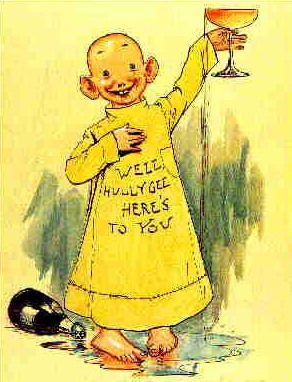We can hardly believe it but the Olympics are almost over. In addition to keeping up with the latest on problems in Sochi, Olympic fashion (our favorites include the Norwegian curling team’s pants, skeleton competitors’ wicked helmets, and this Mariachi ski uniform), and oh yeah events, we’ve been keeping our ears open for fun slang terms. Here are our 12 favorites.
chicken salad
“There’s more to the Winter Olympics than wongbangers, tucks and chicken salads.”
Lawrence Baretto and Aimee Lewis, “Snowboarder Looking for Love,” BBC, February 19, 2014
Chicken salad in this context is not a sandwich filler but “when a snowboarder puts their hands between their legs and grabs the heel-side edge of the board,” according to The Telegraph .
We have no idea where this phrase comes from (and neither does the internet, at least as far as we can tell). All we know is that the chicken salad is more difficult than the melon (short for melancholy) and may be combined with a roast beef (“Back hand grabs through the legs to the heel edge and put head through legs”) to make a beef carpaccio.
double Japan
“Then, left side double corked 1260 double Japan on the first booter, to switch right side dub 1080 tail grab, and a switch right side triple corked 1260 Japan on the big booter.”
Josh Brown, “Junio strong candidate to be Canadian flag-bearer for putting team first,” Guelph Mercury, February 13, 2014
Did you get all that? Let us help: a double Japan, according to NPR, is, in slopestyle, a “a grab with one hand behind your foot, one hand in front on the same ski.” A Japan — which also seems to be known as a Japan air — is “a type of grab (when a skier grabs his skis while in the air).”
Other grabs include the China or Korean air (depending if you’re on the west or east coast, respectively), which are apparently earlier versions of the Japan air, and the Taipan air, which has nothing to do with the James Clavell novel but is a blend of tail and Japan air.
flutz
“The skater must take off using the more difficult outside edge. If she doesn’t, the jump is considered easier and gets fewer points. We call that a ‘flutz.’”
Robert Samuels, “Your complete guide to Olympic women’s figure skating,” The Washington Post, February 19, 2014
A flutz, says Nancy Friedman, is “an incorrectly executed lutz jump” that has devolved into a flip jump. Hence, the word is a blend of flip and lutz. The lutz is named for Australian skater Alois Lutz, the inventor of the jump.
huck it
“As every snowboarder knows, when Morgan said he figured he would ‘just huck it,’ he meant that he decided to go all out with a big jump, throwing his body wildly down the hill.”
Ben Zimmer, “An Olympic Snowboarder said ‘Huck It,’ and the BBC Freaked out,” Slate, February 9, 2014
According to Zimmer, the origins of huck or huck it are unclear but huck “has been developing as a verb for at least 25 years in a number of outdoor sports, as a way of talking about hurling an object or one’s own body with great force.”
BBC thought British snowboarder Billy Morgan uttered another four-letter word that ends in u-c-k, cut short his interview, and apologized for Morgan’s “offensive” language.
K-Fed
“In the world of skiing, the ladies took to the Slopestyle course with a plethora of tricks up their wizard sleeves, including my new favorite sports trick ever named after my #1 yo-yo dieter and tank-topped love, the K-Fed.”
Michelle Collins, “Winter Olympics Day 6 Recap: Welcome to the Winterfell Games,” Vanity Fair, February 12, 2014
The K-Fed is a rail trick, or a trick performed on an obstacle such as a rail, specifically, “a front switch-up blind 270 out.” What the heck does that mean? Perhaps it’s best to take a look.
Although it’s unclear why, the K-Fed is named after Kevin Federline, “dancer, rapper, fashion model,” and erstwhile husband of pop diva Britney Spears. The Britney, by the way, is “a blind switch-up front 270 out.”
kiggle-caggle
“On keen days the concave keeps the ice well; and on dull ones the convex lends itself readily to ‘kiggle-caggle’ — or the oscillating motion which skilful players who want to reduce friction communicate to their stone on very baugh ice.”
John Kerry, History of Curling, 1890
Kiggle-caggle is curling term that seems to have been around since at least 1890, as per the History of Curling. While we couldn’t find an etymology (if anyone can enlighten us, please do so in the comments), we’re guessing the term is imitative in origin.
kiss and cry
“Long a cherished, finger-biting scene on telecasts, the kiss-and-cry zone holds skaters and their coaches captive beside the rink, with cameras in their faces, as they nervously wait for, and then receive, word of their fate from the judges.”
Mary Pilon, “With Team Skating, It’s Now Kiss, Cry, Squeeze In,” The New York Times, February 8, 2014
Kiss and cry, referring to the “the place where skaters waited with their coaches to receive their marks from the judges marks,” says Slate, “was coined by a Finnish skating official named Jane Erkko” in the 1970s. Erko and some young skaters “noticed that the competitors kissed and cried while waiting for their scores,” and the term “remained a joke among the skaters and with Jane as the place where the skaters would sit down after skating their programs.”
shred the gnar
“It’s also a powerful reality check for those who take their physically-intact bodies for granted — or assume people with disabilities can’t shred the gnar.”
Sam Laird, “Canadian Paralympics Ad is a Powerful Reality Check,” Mashable, February 4, 2014
Shredding the gnar refers to skiing a gnarly or difficult terrain, says NPR. To shred means “to ride aggressively.” In our cursory search, we couldn’t find a year of origin for this meaning, nor if it came before or after the meaning “to play very fast (especially guitar solos in rock and metal genres).”
Gnarly was originally a surfing term meaning “dangerous; challenging,” perhaps “with reference to the appearance of rough sea,” says the Oxford English Dictionary (OED). The term originated in the late 1970s.
spoice
“In a sport that prides itself on linguistic innovation (Mr. Kotsenburg, for instance, is fond of the all-purpose approbation ‘spoice’), ‘stoked’ is an old standby to describe a snowboarder’s feeling of euphoria about a good run.”’
Ben Zimmer, “‘Stoked,’ From 1960s Surfers to Sochi,” Wall Street Journal, February 14, 2014
Spoice is apparently “an exclamation of gratitude towards life,” and has been popularized these Olympics by American snowboarder Sage Kotsenburg. We’re guessing the word is an alteration of spice, perhaps in reference to the expression, “variety is the spice of life,” which has been attributed to poet William Cowper.
twizzle
“If you have been watching figure skating throughout the 2014 Winter Olympics, it is impossible not to notice the term ‘twizzle’ that is constantly being dropped by Tara Lipinksi and Johnny Weir throughout the Sochi Games.”
Jose Sanchez, “Sochi Olympics, ice dancing: What is a twizzle?” Fansided, February 17, 2014
Originally referring to simply “a turning, twisting or spinning motion,” a twizzle is, in ice dancing, “three consecutive turns across the ice,” says The Wire. According to Pilar Bosley, a former competitive dancer:
Three turns in general aren’t considered one of the most difficult moves in skating, but when a twizzle is done properly the three turns are done so quickly that the naked eye can’t really tell that that turn is happening.
There are increasing degrees of twizzle-difficulty, such as the catch-foot twizzle, in which the skaters “hop into the first twizzle and then immediately catch their blade with one hand.”
The word twizzle may be an alteration of twissel, “double; twofold,” or else may be an imitative formation suggested by twist, says the OED.
Wagner face
“Ashley Wagner sparked memes and #wagnerface hashtags across the internet after she looked absolutely shocked when her score was revealed at the figure skating competition at Sochi Saturday.”
Brandi Fowler, “Move Over McKayla Maroney, Figure Skater Ashley Wagner Is ‘Not Impressed’ By the Olympics Either,” E! Online, February 9, 2014
While gymnast McKayla Maroney’s “not impressed” expression was the meme of choice for the 2012 London Olympics, Wagner face, referring to figure skater Ashley Wagner’s candid mein, is apparently the 2014 pick.
YOLO flip
“Whether it’s learning to ride a bike, walking in high heels on snow or doing a YOLO flip on the half-pipe, you have your cerebellum to thank.”
Brooke Horton, “Why Some Olympic Athletes Choke, While Others Are Unstoppable,” PolicyMic, February 19, 2014
The YOLO flip, “a double-cork 1440 — four full twists packed inside of two flips,” was invented and named by Swiss snowboarder Iouri Podladtchikov (who goes by the nickname I-Pod). It was also the trick that caused American Shaun White to lose the gold to the 25-year old I-Pod.
And in case you’ve been living in a snow bank all year, YOLO stands for “you only live once.”
[Photo: CC BY 2.0 by Stefan Krasowski]




